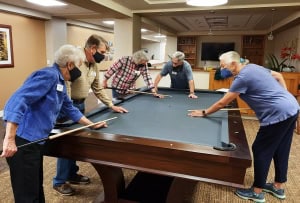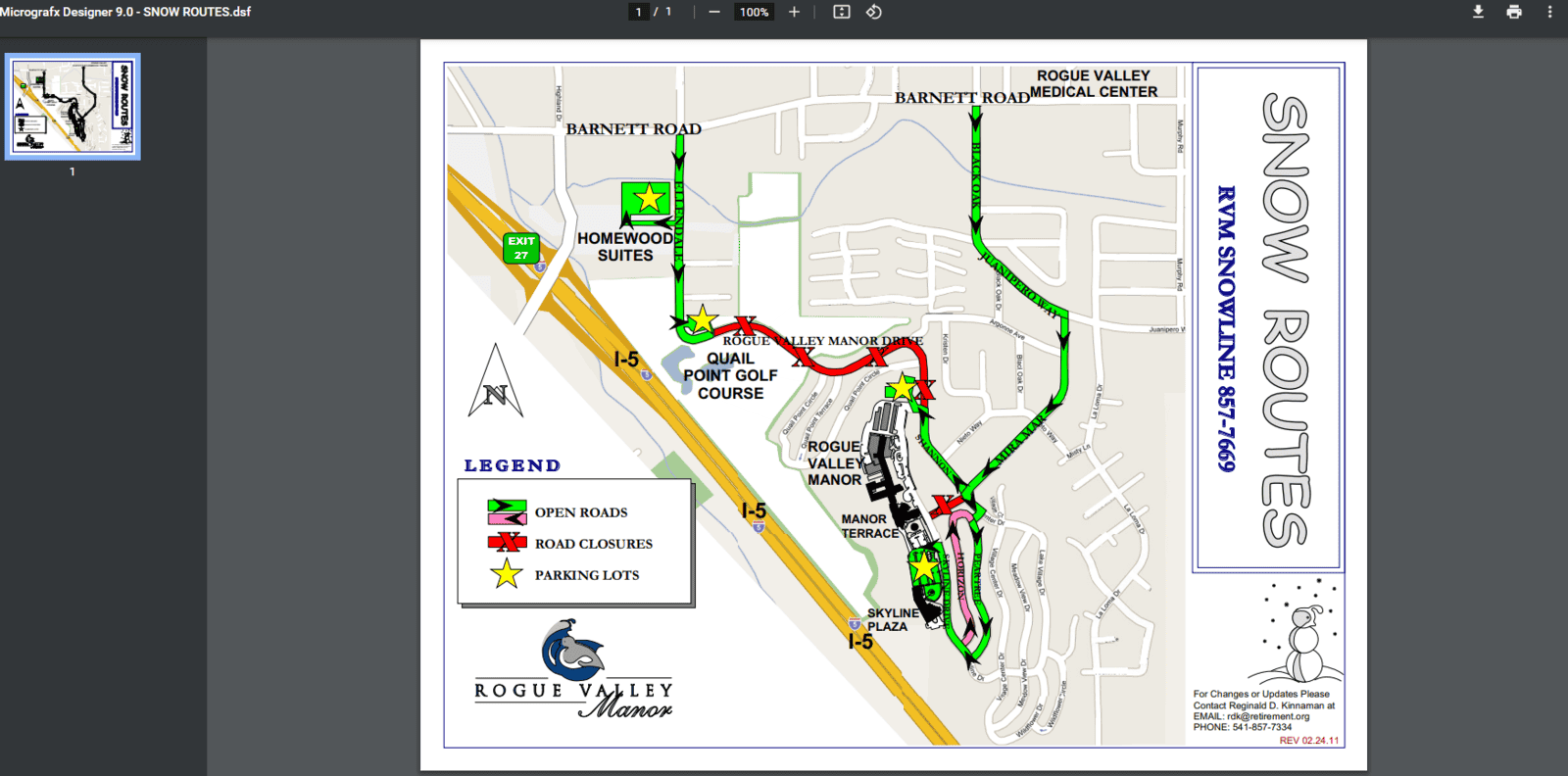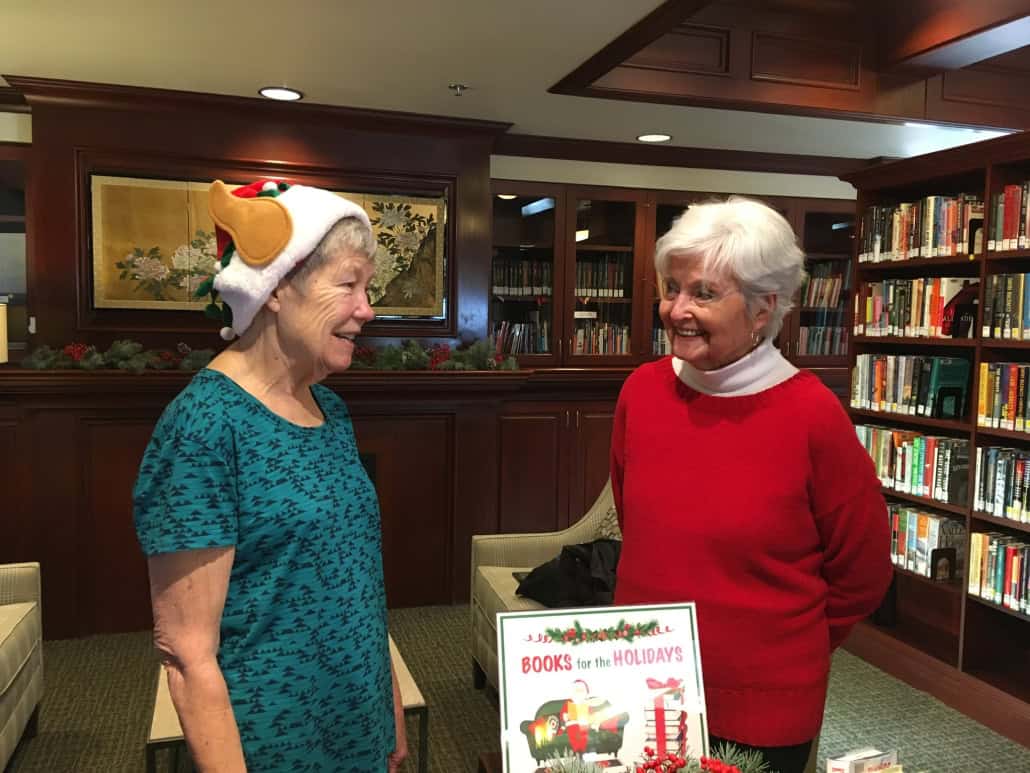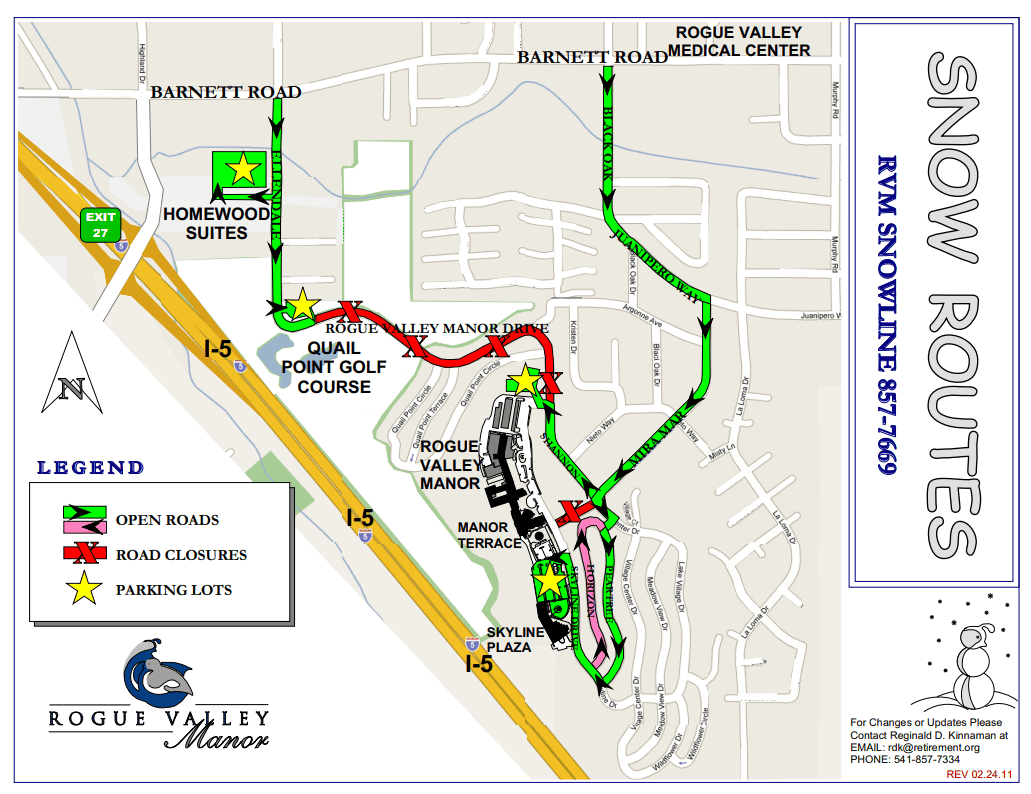Billiards at RVM
by Tim Miller
BILLIARDS (aka POOL) AT ROGUE VALLEY MANOR
 Gosh, it sure is a lot of fun to play Billiards here at Rogue Valley Manor!
Gosh, it sure is a lot of fun to play Billiards here at Rogue Valley Manor!
Well, here’s my story and how I got involved.
I arrived at the Manor a little over a year ago; so many fun things to do here…tennis, pickleball, bocce ball, golf, lawn bowling, table tennis, line dancing, exercise classes and soooo many board games and other activities. All designed to keep us healthy and happy!
What else to try out? As I was visiting the Manor downstairs, I came across some folks playing Billiards.
I remember in my youth playing “pool” and some hit and miss pool at other times in my life. In fact, we had a pool table in our attic for few years. It was nice, but boring. I seldom had anyone to play with.
Just before arriving at RVM, I was playing pool quite a bit where we lived at the Eagle Crest Resort.
I said to myself “what the heck.” Let’s start playing pool again. So much fun and good folks to help me along, thanks to Dan, Butch, Rita and Diane. Very soon I started researching and practicing pool again.
Now I go down and play pool any old time I like. Who cares if it’s rainy, too hot outside or 5am in the morning? The tables are always available. And, WOW, what great tables. I feel like I am playing in a very luxurious Country Club. The tables are the highest quality and they were just refurbished to “like new”.
I can remember as a kid playing on a table in the back room of my barber shop. The table was ancient and I think it even had bumps on it, and it sort of leaned to one side.
Sometimes it’s just a lot of fun to go down and play a solo game by myself or maybe just practice a little (I can sure use the practice). The other day I called a friend I hadn’t seen in a while and we are going to get together soon and play some Billiards. Maybe we will contact a couple of other players listed on RVM Billiard website and play some team Billiards.
After playing for a few months in the “Ole RVM Billiard Parlor,” pretty soon I was playing a fairly decent game again. No expert, but I was having fun and feeling a certain degree of proficiency. I have always enjoyed my passion for sports by sharing (instructing) with others whatever expertise I had learned (Judo, Tennis, Boating and Pickleball). Living in a Senior community…Billiards was the ideal place to start lessons in Billiards.
Beginner Billiard Lessons have started at Rogue Valley Manor! Over the next few months, we had about 20 students complete the 2-hour Beginner Session (learning the fundamentals). Interestingly, 14 of these 20 students were women. The great thing about pool is that the male has NO physical advantage. There have even been a few students who wanted to take their lessons a step further…6 of them are now enrolled in an advanced pool mentoring program (3 ladies & 2 men).
In a couple of months, we will have open enrollment of our next Beginner Lessons…watch for it on MyRVM. STAY TUNED!
For more information about Billiards at RVM, contact:
Dan Curtis (X6899) dbcurtis@gmail.com Co-chairperson for our Billiards community; or
Butch Findley (X6161) bf6695@gmail.com Co-chairperson for our Billiards community; or
Tim Miller (6891) tennistim2@gmail.com Instructor
Visit our Website at: RVM Billiards
Interesting History of Billiards
It evolved from a lawn game similar to the croquet played some-time during the 15th century in Northern Europe. Play moved indoors to a wooden table with green cloth to simulate grass, and a simple border was placed around the edges. Initially, the balls on the table were hit with a mallet. Later the “pool cue’” evolved which allowed more precision hitting.
The term “poolroom” now means a place where pool is played, but in the 19th century a poolroom was a betting parlor for horse racing. Pool tables were installed so patrons could pass time between races. The two became connected in the public mind, but the unsavory connotation of “poolroom” came from the betting that took place there, not from billiards.
In the 1920’s, the poolroom was an environment in which men gathered to loiter, smoke, fight, bet, and play. The rooms of today bear no resemblance to those of the earlier times. Until very recently, billiards was completely dominated by men. In the past, it was very difficult for a woman to develop billiard skills because male players, her family, and friends usually did not support her efforts. These situations have changed…women are now accepted as equals with men in Billiards today.
“Billiards” is an all-inclusive term. It includes any game played on a billiard table, with or without pockets. These various games include snooker, pocket pool, etc.










